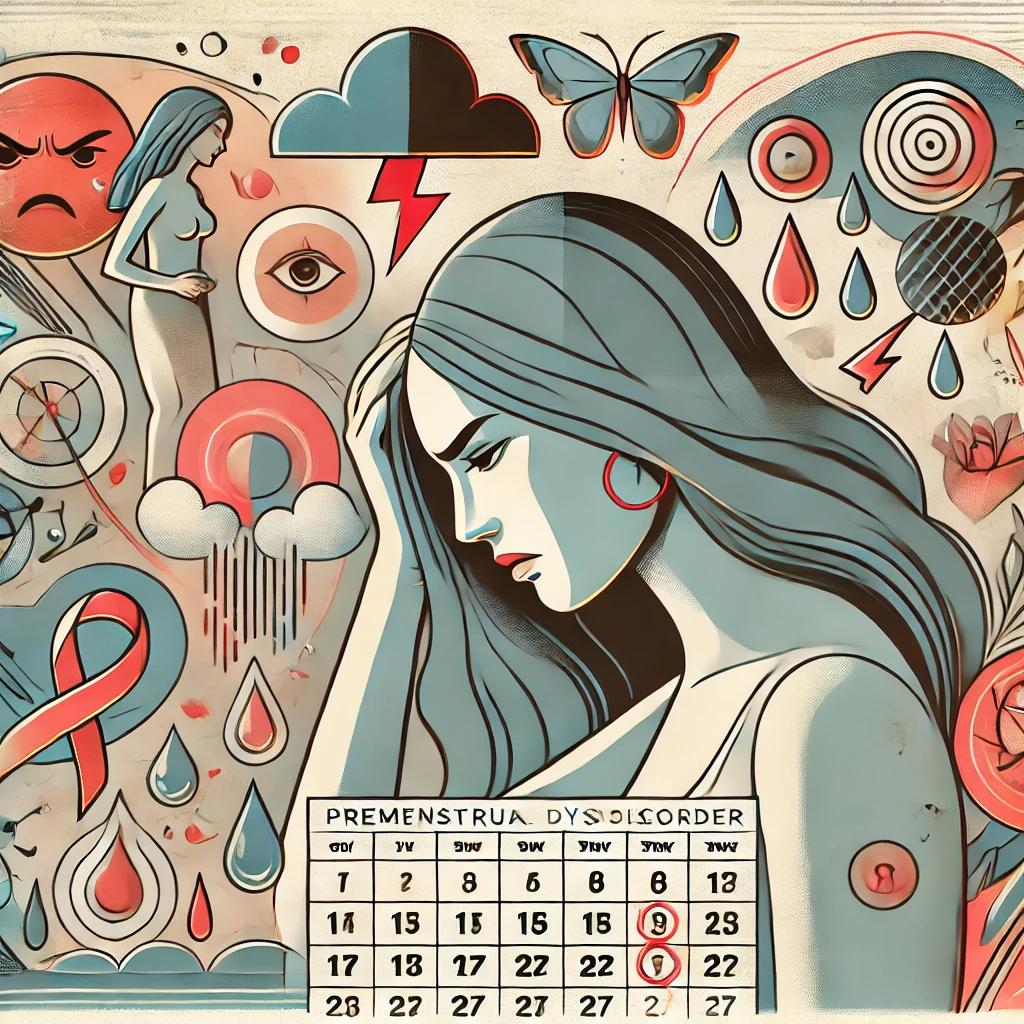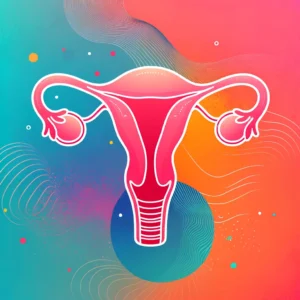
ADHD and PMDD | Kristen McClure, Therapist

Understanding ADHD and PMDD: Navigating Treatment and Support
If you feel like you are going crazy, have massive mood swings, and your life is out of control, but then everything is calm and returns to normal, you may have PMDD. PMDD, or Premenstrual Dysphoric Disorder, is a hormonal condition characterized by severe emotional and physical symptoms that occur in the luteal phase—the week or two before menstruation—and can significantly interfere with your daily life.
If you feel like you are going crazy, have massive mood swings, and your life is out of control in cycles, and then everything returns to normal, you may have PMDD.
Symptoms of PMDD
Think you might have PMDD? Look at the list below to see if any of these symptoms ring true for you.
If you have PMDD, during 4-10 days a month, you might experience the following:
🟢 Mood Swings: Quick mood changes, like suddenly feeling sad or crying easily.
🟢 Sensitivity: Feeling extra sensitive to rejection or criticism.
🟢 Irritability: Getting angry or irritated easily, often leading to arguments with friends or family.
🟢 Depression: Feeling very down or hopeless at times.
🟢 Anxiety: Frequently feeling anxious, tense, or on edge.
These emotional symptoms can make everyday life feel more challenging, during the week before your period.
You might also notice:
🟢 Cognitive Symptoms: Increased difficulty concentrating, staying focused, or feeling overwhelmed.
🟢 Behavioral and Physical Symptoms: Losing interest in activities you usually enjoy, feeling extremely tired, changes in appetite (like eating more or craving specific foods), sleep disturbances (trouble falling or staying asleep, or sleeping too much), and physical symptoms such as breast tenderness, swelling, or bloating.
How is PMDD Different from PMS?
While PMS (Premenstrual Syndrome) might involve mild symptoms like bloating or mood changes that don't heavily disrupt daily life, PMDD is much more severe—women with PMDD experience intense mood swings, sometimes even resulting in suicidal thoughts or self-harm.
PMDD can even lead to significant depression, anxiety, and other physical symptoms that seriously affect daily life and relationships.
How is a Diagnosis of PMDD Made?
Diagnosing PMDD involves tracking symptoms over at least two menstrual cycles to confirm their cyclical nature and differentiate PMDD from other mood disorders. A woman must experience at least five symptoms—including mood-related ones—specifically in the week before her period, with these symptoms improving shortly after menstruation begins.
PMDD is also less common than PMS, affecting about 3-8% of women, while PMS affects up to 75% of women. Some research shows that in ADHD women, these rates are much higher, with estimates upwards of half of ADHD women having PMDD.
How are PMDD symptoms Tracked
The Daily Record of Severity of Problems (DRSP) is one tool that helps chart daily symptoms. The International Association for Premenstrual Disorders (IAPMD) provides additional resources and support, but the process can feel burdensome and overwhelming even with these tools.
Why Is It So Hard to Recognize PMDD if You Have ADHD?
For women with ADHD, recognizing PMDD can be particularly challenging due to time blindness, alexithymia, interoception issues, and medical professionals who don't screen for or look for these symptoms. You might feel like your emotions are all over the place, but not realize they follow a cyclical pattern linked to hormonal changes.
The idea of tracking your cycle can seem inconvenient and overwhelming. Keeping a detailed record of symptoms every day for several months can feel overwhelming. However, period tracking is a beneficial thing for any woman to do. All ADHD women have symptoms that will vary with their hormones and period, and their support and treatment needs will fluctuate according to hormones according to their life cycle.
Navigating Treatment and Support for ADHD and PMDD
Here are some strategies and support options to consider:
Tailored Medication Plans
Discuss with your healthcare provider the possibility of adjusting your medication regimen to manage both ADHD and PMDD symptoms better. This might involve:
🟢Taking Meds every Day or Continuous Dosing of Antidepressants: Some antidepressants are effective in treating PMDD when taken daily.
🟢 Taking Meds only during Part of your Cycle or Intermittent Dosing: If your menstrual cycle is regular, your provider might suggest taking medication only during the luteal phase (the two weeks before your period starts).
🟢Changing How High the Dose is During Part of Your Cycle or Luteal Phase Dose Adjustment: For some, a temporary increase in medication dosage during the luteal phase helps manage worsening symptoms.
Consider Hormonal Treatments
Hormonal treatments, such as oral contraceptives, might help stabilize mood swings and other symptoms associated with PMDD. Some women find relief with certain birth control pills that are taken continuously to prevent hormonal fluctuations.
Non-Pharmacological Approaches
Lifestyle changes can play a crucial role in managing symptoms. Consider the following:
🟢Dietary Adjustments: Reducing caffeine, sugar, and alcohol intake can help stabilize mood and energy levels.
🟢Regular Exercise: Physical activity reduces stress, boosts mood, and improves overall well-being.
🟢Mindfulness and Relaxation Techniques: Practices like yoga, meditation, and deep-breathing exercises can help manage stress and improve emotional regulation.
Vitamins
Ask your doctor about these options for associated issues:
- Calcium (1200 mg): May help reduce the severity of PMDD symptoms, including mood stabilization and reducing depression and anxiety.
- Vitamin B6 (50-100 mg): Could alleviate symptoms like mood swings, irritability, and bloating; use with caution to avoid toxicity.
- Magnesium (200-460 mg): Might help with water retention, bloating, and mood swings, though evidence is not conclusive.
- Vitamin E (400 IU): Often recommended for PMS symptoms; effectiveness for PMDD is not well established but may help with breast tenderness.
Advocating for Yourself
It’s important to advocate for your needs and ensure your healthcare providers understand the unique interplay between ADHD and PMDD. Here are some steps you can take:
- Educate Providers: Bring up the connection between ADHD and PMDD with your doctor, especially if you feel your symptoms are not being fully addressed.
- Provide Research: Share relevant studies that highlight the link between ADHD and PMDD to help your healthcare team understand your experiences better.
Here are two that discuss important issues
Female-specific pharmacotherapy in ADHD: premenstrual adjustment of psychostimulant dosage.
Prevalence of hormone-related mood disorder symptoms in women with ADHD
Be Open About Your Symptoms: Keep a detailed symptom diary and be honest with your provider about your feelings. This can help them make more informed decisions about your treatment plan.
- Ask Questions: I've listed some questions here that you can ask your doctor and your therapist:
Self-Care Practices
Living with ADHD and PMDD requires self-awareness and compassion. Remember to:
- Monitor Your Symptoms: Keep track of your mood and physical symptoms to identify patterns and plan for self-care.
- Schedule Low-Stress Activities: Plan your most demanding tasks during times when you typically feel your best and allow yourself to rest during more challenging days.
Supporting Women with ADHD and PMDD
If you know someone dealing with ADHD and PMDD, offering empathy and understanding is key. Listen without judgment, provide support during challenging times, and encourage them to seek professional help.
Moving Forward with Confidence
Having both ADHD and PMDD is hard, especially when time blindness makes it hard to see patterns, and tracking symptoms feels like an uphill battle. Doctors often make it hard too.
But with the right strategies and support, managing your symptoms and improving your quality of life is entirely possible. Stay informed, advocate for your needs, and remember—you are not alone in this journey. You can find a treatment plan that works best for you with patience and persistence.
More Resources
The International Association for Premenstrual Disorders has more information about diagnosis and support, and I recommend it.
References
De Jong, M., Wynchank, D. S. M. R., van Andel, E., Beekman, A. T. F., & Kooij, J. J. S. (2023). Female-specific pharmacotherapy in ADHD: premenstrual adjustment of psychostimulant dosage. Frontiers in Psychiatry, 14, 1306194. https://doi.org/10.3389/fpsyt.2023.1306194
Dorani, F., Bijlenga, D., Beekman, A.T.F., Van Someren, E.J.W. and Kooij, J.J.S., 2021. Prevalence of hormone-related mood disorder symptoms in women with ADHD. Journal of Psychiatric Research, 133(3), pp.10-15. doi:10.1016/j.jpsychires.2020.12.005.
Petrillo F. L.Psychiatric Disorders in Women: Diagnostic and Treatment Considerations Across the Female Lifespan (February 2020) PMDD https://mghcme.org/


